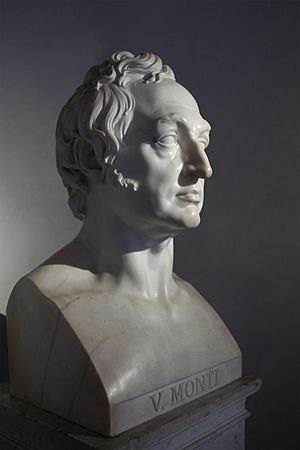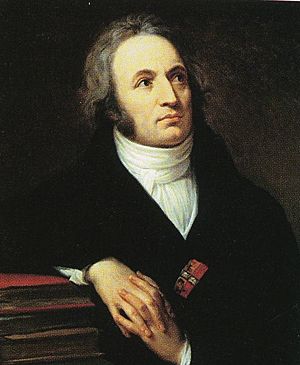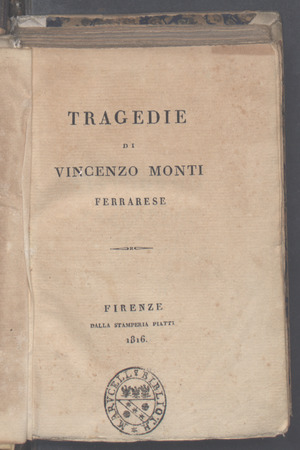Vincenzo Monti facts for kids
Vincenzo Monti (born February 19, 1754 – died October 13, 1828) was a famous Italian poet, playwright (someone who writes plays), translator, and scholar. He was a leading figure in Italian neoclassicism, a style of art and literature that looked back to ancient Greek and Roman times. His translation of the Iliad, an ancient Greek epic poem, is considered one of the best ever. Its opening lines are very well-known in Italy.
Contents
Early Life and Education
Vincenzo Monti was born in Alfonsine, a town in Italy. His parents, Fedele and Domenica Maria Mazzari, were landowners. He went to school at a seminary in Faenza and later studied medicine and law at the University of Ferrara.
Moving to Rome and Early Works
In 1775, Monti became a member of the Academy of Arcadians, a group of poets. The next year, his first book, "La visione di Ezechiello" (Ezekiel's Vision), was published. In 1778, he moved to Rome after being invited by a cardinal. There, he married Teresa Pichler. They had a daughter named Costanza and a son named Francesco, who sadly died very young.
In 1785, Monti published his play "Aristodemo," which was very popular. His poem "Bassvilliana" (1793) also became famous. It was written after the killing of Nicolas Jean Hugou de Basseville, a French representative in Rome. This poem was so popular that it had 18 editions in just six months!
Life in Milan and Translations
In 1797, Monti left Rome and settled in Milan. He changed his views and became a supporter of the new Cisalpine Republic, which was influenced by the French Revolution.
When the French were defeated in 1799, Monti had to leave Milan. But he returned just two years later after the French won the Battle of Marengo (1800). While in Paris, Monti spent more and more time translating works from French and Latin. These translations are now considered some of his best work. He translated "La Pucelle d'Orleans" by Voltaire, the "Satire" by Persius, and the "Iliade" (Iliad) by Homer.

After returning to Italy, Monti published another play called "Caio Gracco." He also wrote "La Mascheroniana," a poem about his friend Lorenzo Mascheroni, and a beautiful hymn called "Bell'Italia." In 1803, Monti became a professor at the University of Pavia. When Napoleon became emperor in 1805, Monti was chosen to be his historian. He wrote many poems praising Napoleon and his family. Napoleon also made him a knight of the Legion of Honour and the Order of the Iron Crown.
Later Years and Legacy
After Napoleon's power ended in 1815, Monti tried to gain favor with the new Austrian rulers by writing poems like "Il mistico omaggio." In his final years, he focused on developing the Italian language.
What People Thought of Monti
Many writers and critics have had different opinions about Vincenzo Monti. Two main points are often discussed:
- Changing Views: Monti lived during a time of big political changes. Some people criticized him for changing his political views often. He was first against the French Revolution, then supported Napoleon, and later supported the Austrian Empire. Critics felt he didn't stick to his beliefs.
- Focus on Style: Some also said that Monti cared more about how his poems sounded and looked (their "formal aspects") than about expressing deep, true feelings.
Famous Italian writers like Ugo Foscolo and Giacomo Leopardi believed that a poet should always stand by their beliefs and that the meaning of a work was more important than just perfect writing style. They thought Monti's changing views and focus on form were weaknesses, especially during the time of the "Risorgimento", when strong ideals were very important. However, everyone agreed he had amazing technical skills as a writer.
Main Works by Vincenzo Monti
Monti wrote many different types of works, including poems, plays, and translations. Here are some of his important works:
- 1776 – "La visione di Ezechiello" (A vision)
- 1787 – "Aristodemo" (A tragedy play)
- 1793 – "Bassvilliana" (An unfinished poem)
- 1800 – Translation of Voltaire's "La Pucelle d'Orléans"
- 1802 – "Caio Gracco" (A tragedy play)
- 1802 – "Mascheroniana" (A poem about his friend Lorenzo Mascheroni)
- 1803 – Translation of "Satire" by Persius
- 1810 – Translation of the "Iliade" by Homer
- 1817–1826 – "Proposta di alcune correzioni ed aggiunte al Vocabolario della Crusca" (A proposal for corrections to a dictionary)
See also
 In Spanish: Vincenzo Monti para niños
In Spanish: Vincenzo Monti para niños
 | Percy Lavon Julian |
 | Katherine Johnson |
 | George Washington Carver |
 | Annie Easley |



